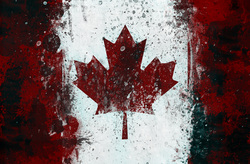
Human trafficking is not a problem exclusive to distant countries.
Women, and often children, are being bought, sold and exploited for labour or sex in neighbourhoods in Waterloo Region and throughout the country without gaining much attention from the general public.
Women, and often children, are being bought, sold and exploited for labour or sex in neighbourhoods in Waterloo Region and throughout the country without gaining much attention from the general public.
“People still do not think it is happening in Canada, let alone here,” said Sister Dorothy Goetz, a member of the School Sisters of Notre Dame in Waterdown, Ont.
Our Lady of Lourdes Church in Waterloo turned a spotlight on the issue of human trafficking by hosting Goetz and her fellow members of the School Sisters of Notre Dame to inform the local citizens about the illegal industry back in September.
Local members of the school learned about the issue through initiatives run by their international congregation. They were inspired to take action after attending a conference in 2003 where they heard a talk by a nun who fought against human trafficking in Italy.
“I came away saying … surely there’s something I can do,” Goetz said.
Goetz and a committee of 14 other women run workshops across Southwestern Ontario to raise awareness about the issue.
Speaking about this region specifically, Goetz said that trafficking happens here because the region has many venues such as bars, illegal massage parlours and adult entertainment clubs and is also close to the GTA.
She said women are brought here to work but live in other cities. The women’s constant movement prevents suspicion in local communities and makes it hard for law enforcement to track them.
One instance in particular Goetz learned of from law enforcement representatives involved a trafficker from Mississauga who took women to multiple bars and brothels in London, Kitchener and Guelph on any given night so they could make the amount of money he wanted.
That movement from the GTA doesn’t mean traffickers aren’t based in the region, too.
“We believe that there are places in Kitchener, in the K-W area, that are residences for trafficked women,” Goetz said.
Although many of the women are brought from other countries, Canadians also fall victim to the trade.
“Young teenagers especially are very vulnerable,” Goetz said. “They may have a fight with their mother … and take off.”
Technology also has created a risk, where predators lure young women and teens online with the prospects of a relationship or career but trap them in sex trafficking instead.
Goetz said high school students need to be better educated on human trafficking and online predators in particular. She and other sisters have given presentations to schools to encourage youth to be critical about who they talk to online.
Yet despite growing awareness about human trafficking, statistics on its prevalence in Canada remain unclear.
Goetz said that the RCMP estimates there are anywhere from 600 and 800 people in the human trafficking network in Canada, however non-government organizations advocating against trafficking estimate the number is more likely in the thousands.
Goetz says the sisters hope not only to educate parents about protecting their children but also to look out for signs of human trafficking in their communities.
Calling Crime Stoppers about signs of abused women or suspicions of women being harboured against their will help penetrate and stop trafficking operations.
“I think everybody has to become aware this is happening right around us,” Goetz said.
Our Lady of Lourdes Church in Waterloo turned a spotlight on the issue of human trafficking by hosting Goetz and her fellow members of the School Sisters of Notre Dame to inform the local citizens about the illegal industry back in September.
Local members of the school learned about the issue through initiatives run by their international congregation. They were inspired to take action after attending a conference in 2003 where they heard a talk by a nun who fought against human trafficking in Italy.
“I came away saying … surely there’s something I can do,” Goetz said.
Goetz and a committee of 14 other women run workshops across Southwestern Ontario to raise awareness about the issue.
Speaking about this region specifically, Goetz said that trafficking happens here because the region has many venues such as bars, illegal massage parlours and adult entertainment clubs and is also close to the GTA.
She said women are brought here to work but live in other cities. The women’s constant movement prevents suspicion in local communities and makes it hard for law enforcement to track them.
One instance in particular Goetz learned of from law enforcement representatives involved a trafficker from Mississauga who took women to multiple bars and brothels in London, Kitchener and Guelph on any given night so they could make the amount of money he wanted.
That movement from the GTA doesn’t mean traffickers aren’t based in the region, too.
“We believe that there are places in Kitchener, in the K-W area, that are residences for trafficked women,” Goetz said.
Although many of the women are brought from other countries, Canadians also fall victim to the trade.
“Young teenagers especially are very vulnerable,” Goetz said. “They may have a fight with their mother … and take off.”
Technology also has created a risk, where predators lure young women and teens online with the prospects of a relationship or career but trap them in sex trafficking instead.
Goetz said high school students need to be better educated on human trafficking and online predators in particular. She and other sisters have given presentations to schools to encourage youth to be critical about who they talk to online.
Yet despite growing awareness about human trafficking, statistics on its prevalence in Canada remain unclear.
Goetz said that the RCMP estimates there are anywhere from 600 and 800 people in the human trafficking network in Canada, however non-government organizations advocating against trafficking estimate the number is more likely in the thousands.
Goetz says the sisters hope not only to educate parents about protecting their children but also to look out for signs of human trafficking in their communities.
Calling Crime Stoppers about signs of abused women or suspicions of women being harboured against their will help penetrate and stop trafficking operations.
“I think everybody has to become aware this is happening right around us,” Goetz said.


 RSS Feed
RSS Feed